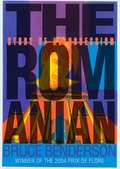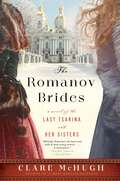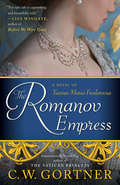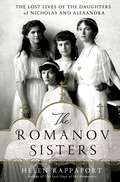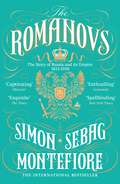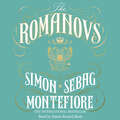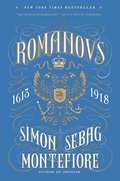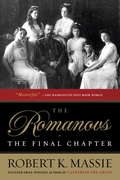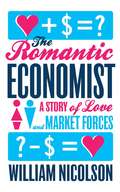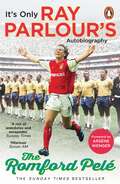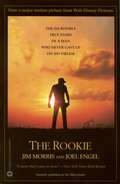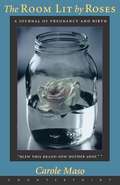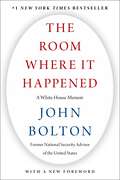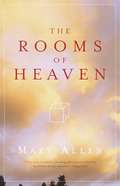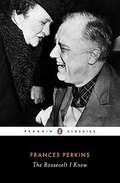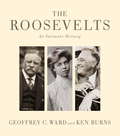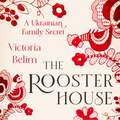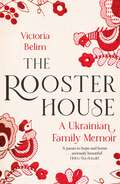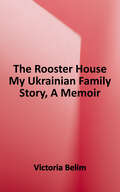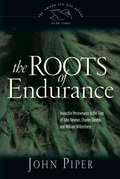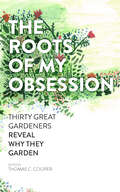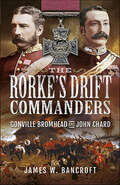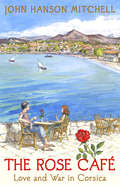- Table View
- List View
The Romanian
by Bruce Benderson'History follows a trail of sputtering desire, often calling upon the delusions of lovers to generate the sparks. If it weren't for us, the world would suffer from a dismal lack of stories. ' In this brutally candid memoir, writer, translator and journalist Bruce Benderson recounts his unrequited love for an impoverished Romanian whom he meets while on a journalism assignment in Eastern Europe. Rather than retreat, Benderson absorbs everything he can about Romania, its culture and its history and discovers a mirror in it for his own turmoil: the wild affairs of its last king, Carol II. Free of bitterness, nastiness, or any desire to protect himself, he is sustained throughout by little white codeine pills, a poetic self-awareness, a sense of humor, and an unwavering belief in the perfect romance, even as wild dogs chase him down Romanian streets.
The Romanov Brides: A Novel of the Last Tsarina and Her Sisters
by Clare McHughFrom the author of A Most English Princess comes a rich novel about young Princess Alix of Hesse—the future Alexandra, last Empress of Imperial Russia—and her sister, Princess Ella. Their decision to marry into the Romanov royal family changed history. They were granddaughters of Queen Victoria and two of the most beautiful princesses in Europe. Princesses Alix and Ella were destined to wed well and wisely. But while their grandmother wants to join them to the English and German royal families, the sisters fall in love with Russia—and the Romanovs. Defying the Queen’s dire warnings, Ella weds the tsar’s brother, Grand Duke Serge. Cultivated, aloof, and proud, Serge places his young wife on a pedestal for all to admire. Behind palace gates, Ella struggles to secure private happiness. Alix, whisked away to Russia for Ella’s wedding, meets and captivates Nicky—heir apparent to the Russian throne. While loving him deeply, Alix hears a call of conscience, urging her to walk away. Their fateful decisions to marry will lead to tragic consequences for not only themselves and their families, but for millions in Russia and around the globe. The Romanov Brides is a moving and fascinating portrait of two bold and spirited royal sisters, and brings to vivid life imperial Russia—a dazzling, decadent world on the brink of disappearing forever.
The Romanov Empress: A Novel of Tsarina Maria Feodorovna
by C. W. GortnerFor readers of Philippa Gregory and Alison Weir comes a dramatic novel of the beloved Empress Maria, the Danish girl who became the mother of the last Russian tsar. Even from behind the throne, a woman can rule.Narrated by the mother of Russia’s last tsar, this vivid, historically authentic novel brings to life the courageous story of Maria Feodorovna, one of Imperial Russia’s most compelling women, who witnessed the splendor and tragic downfall of the Romanovs as she fought to save her dynasty in its final years. Barely nineteen, Minnie knows that her station in life as a Danish princess is to leave her family and enter into a royal marriage—as her older sister Alix has done, moving to England to wed Queen Victoria’s eldest son. The winds of fortune bring Minnie to Russia, where she marries the Romanov heir, Alexander, and once he ascends the throne, becomes empress. When resistance to his reign strikes at the heart of her family and the tsar sets out to crush all who oppose him, Minnie—now called Maria—must tread a perilous path of compromise in a country she has come to love. Her husband’s death leaves their son Nicholas as the inexperienced ruler of a deeply divided and crumbling empire. Determined to guide him to reforms that will bring Russia into the modern age, Maria faces implacable opposition from Nicholas’s strong-willed wife, Alexandra, whose fervor has led her into a disturbing relationship with a mystic named Rasputin. As the unstoppable wave of revolution rises anew to engulf Russia, Maria will face her most dangerous challenge and her greatest heartache. From the opulent palaces of St. Petersburg and the intrigue-laced salons of the aristocracy to the World War I battlefields and the bloodied countryside occupied by the Bolsheviks, C. W. Gortner sweeps us into the anarchic fall of an empire and the complex, bold heart of the woman who tried to save it.Advance praise for The Romanov Empress“Through the voice of Maria, [C. W.] Gortner succeeds in adding a new perspective to the well-known story of Nicholas, Alexandra, and Rasputin. As a sister, wife, mother, and empress, she is a fierce and dynamic narrator.”—Library Journal “Gortner, an experienced hand at recreating the unique aura of a particular time and place, will deftly sweep historical-fictions fans into this glamorous, turbulent, and ultimately tragic chapter in history.”—Booklist (starred review)
The Romanov Sisters: The Lost Lives of the Daughters of Nicholas and Alexandra
by Helen RappaportThey were the Princess Dianas of their day—perhaps the most photographed and talked about young royals of the early twentieth century. The four captivating Russian Grand Duchesses—Olga, Tatiana, Maria and Anastasia Romanov—were much admired for their happy dispositions, their looks, the clothes they wore and their privileged lifestyle. Over the years, the story of the four Romanov sisters and their tragic end in a basement at Ekaterinburg in 1918 has clouded our view of them, leading to a mass of sentimental and idealized hagiography. With this treasure trove of diaries and letters from the grand duchesses to their friends and family, we learn that they were intelligent, sensitive and perceptive witnesses to the dark turmoil within their immediate family and the ominous approach of the Russian Revolution, the nightmare that would sweep their world away, and them along with it. The Romanov Sisters sets out to capture the joy as well as the insecurities and poignancy of those young lives against the backdrop of the dying days of late Imperial Russia, World War I and the Russian Revolution. Helen Rappaport aims to present a new and challenging take on the story, drawing extensively on previously unseen or unpublished letters, diaries and archival sources, as well as private collections. It is a book that will surprise people, even aficionados.
The Romanovs: 1613-1918
by Simon Sebag MontefioreThe Romanovs were the most successful dynasty of modern times, ruling a sixth of the world's surface. How did one family turn a war-ruined principality into the world's greatest empire? And how did they lose it all?This is the intimate story of twenty tsars and tsarinas, some touched by genius, some by madness, but all inspired by holy autocracy and imperial ambition. Montefiore's gripping chronicle reveals their secret world of unlimited power and ruthless empire-building, overshadowed by palace conspiracy, family rivalries, sexual decadence and wild extravagance, and peopled by a cast of adventurers, courtesans, revolutionaries and poets. Written with dazzling literary flair, drawing on new archival research, THE ROMANOVS is at once an enthralling chronicle of triumph and tragedy, love and death, a universal study of power, and an essential portrait of the empire that still defines Russia today.
The Romanovs: 1613-1918
by Simon Sebag MontefioreThe Romanovs were the most successful dynasty of modern times, ruling a sixth of the world's surface. How did one family turn a war-ruined principality into the world's greatest empire? And how did they lose it all? This is the intimate story of twenty tsars and tsarinas, some touched by genius, some by madness, but all inspired by holy autocracy and imperial ambition. Montefiore's gripping chronicle reveals their secret world of unlimited power and ruthless empire-building, overshadowed by palace conspiracy, family rivalries, sexual decadence and wild extravagance, and peopled by a cast of adventurers, courtesans, revolutionaries and poets, from Ivan the Terrible to Tolstoy, from Queen Victoria to Lenin. To rule Russia was both imperial-sacred mission and poisoned chalice: six tsars were murdered and all the Romanovs lived under constant threat to their lives. Peter the Great tortured his own son to death while making Russia an empire, and dominated his court with a dining club notable for compulsory drunkenness, naked dwarfs and fancy dress. Catherine the Great overthrew her own husband - who was murdered soon afterwards - loved her young male favourites, conquered Ukraine and fascinated Europe. Paul was strangled by courtiers backed by his own son, Alexander I, who faced Napoleon's invasion and the burning of Moscow, then went on to take Paris. Alexander II liberated the serfs, survived five assassination attempts, and wrote perhaps the most explicit love letters ever written by a ruler. THE ROMANOVS climaxes with a fresh, unforgettable portrayal of Nicholas and Alexandra, the rise and murder of Rasputin, war and revolution - and the harrowing massacre of the entire family. Written with dazzling literary flair, drawing on new archival research, THE ROMANOVS is at once an enthralling story of triumph and tragedy, love and death, a universal study of power, and an essential portrait of the empire that still defines Russia today.Read by Simon Russell Beale(p) 2016 Orion Publishing Group
The Romanovs: 1613-1918
by Simon Sebag MontefioreThe Romanovs were the most successful dynasty of modern times, ruling a sixth of the world's surface for three centuries. How did one family turn a war-ruined principality into the world's greatest empire? And how did they lose it all? This is the intimate story of twenty tsars and tsarinas, some touched by genius, some by madness, but all inspired by holy autocracy and imperial ambition. Simon Sebag Montefiore's gripping chronicle reveals their secret world of unlimited power and ruthless empire-building, overshadowed by palace conspiracy, family rivalries, sexual decadence and wild extravagance, with a global cast of adventurers, courtesans, revolutionaries and poets, from Ivan the Terrible to Tolstoy and Pushkin, to Bismarck, Lincoln, Queen Victoria and Lenin. To rule Russia was both imperial-sacred mission and poisoned chalice: six of the last twelve tsars were murdered. Peter the Great tortured his own son to death while making Russia an empire, and dominated his court with a dining club notable for compulsory drunkenness, naked dwarfs and fancy dress. Catherine the Great overthrew her own husband (who was murdered soon afterward), enjoyed affairs with a series of young male favorites, conquered Ukraine and fascinated Europe. Paul I was strangled by courtiers backed by his own son, Alexander I, who in turn faced Napoleon's invasion and the burning of Moscow, then went on to take Paris. Alexander II liberated the serfs, survived five assassination attempts and wrote perhaps the most explicit love letters ever composed by a ruler. The Romanovs climaxes with a fresh, unforgettable portrayal of Nicholas II and Alexandra, the rise and murder of Rasputin, war and revolution--and the harrowing massacre of the entire family.Dazzlingly entertaining and beautifully written from start to finish, The Romanovs brings these monarchs--male and female, great and flawed, their families and courts--blazingly to life. Drawing on new archival research, Montefiore delivers an enthralling epic of triumph and tragedy, love and murder, encompassing the seminal years 1812, 1914 and 1917, that is both a universal study of power and a portrait of empire that helps define Russia today.
The Romanovs: The Final Chapter (Great Lives Ser.)
by Robert K. MassieIn July 1991, nine skeletons were exhumed from a shallow mass grave near Ekaterinburg, Siberia, a few miles from the infamous cellar room where the last tsar and his family had been murdered seventy-three years before. But were these the bones of the Romanovs? And if these were their remains, where were the bones of the two younger Romanovs supposedly murdered with the rest of the family? Was Anna Anderson, celebrated for more than sixty years in newspapers, books, and film, really Grand Duchess Anastasia? The Romanovs provides the answers, describing in suspenseful detail the dramatic efforts to discover the truth. Pulitzer Prize winner Robert K. Massie presents a colorful panorama of contemporary characters, illuminating the major scientific dispute between Russian experts and a team of Americans, whose findings, along with those of DNA scientists from Russia, America, and Great Britain, all contributed to solving one of the great mysteries of the twentieth century.
The Romantic Economist
by William NicolsonA wise and humorous memoir about a young economist trying to apply the rules of the market to his own floundering dating life. "I know that this sounds like a bit of a cliché, but really, it's not you..." The woman who said this to William Nicolson was funny, talented and unbearably beautiful. His mother said he ought to marry that girl. And he lost her in a personal best time of six weeks. It was when he found himself being dumped like this yet again that he decided something had to be done. William is an economist, which means he's good at reducing an infinitely complex world into a set of clear, rational principles about the way people and markets behave. Unfortunately, he has never been able to replicate this in the world of romance. Girls confuse him; they're the very definition of infinite complexity. In this book, he sets out to apply the rules of economics to his shaky love life. For a time, everything seems to be clearer. Want to play hard to get? Reduce your supply. Want a girlfriend? Find an undervalued asset. Why are all the good ones taken? That'll be the Efficient Market Hypothesis. But things don't work out quite as he'd hoped, and he's more isolated than ever. Can he find the perfect economic theory to rescue him from a future of lonely nights, or is the dating game too intricate to be won by logical, rational thinking?
The Romford Pelé: It’s only Ray Parlour’s autobiography
by Ray ParlourTHE SUNDAY TIMES TOP TEN BESTSELLERThe Trophies … The Tuesday Club … The Prawn Crackers … Marc Overmars may have given him the nickname, but the Romford Pele is a legend in his own right. Over 16 action-packed years, from a trainee scrubbing the boots of the first XI, to a record-breaking 333 Premier League appearances, Ray Parlour’s never-say-die performances, curly locks and mischievous sense of humour have gone down in Arsenal history.Battling tirelessly on the pitch, often in the shadows of his star-name teammates, Parlour won three premier league titles and four FA Cup trophies with the Gunners. But he was also the heart and soul of the dressing room, the training ground and the after work drink. From nights out with Tony Adams, to teaching Thierry Henry cockney rhyming slang, from playing golf with Dennis Bergkamp to trading Inspector Clouseau jokes with Arsène Wenger, this wonderfully funny and candid autobiography looks back on a golden age of the beautiful game, reliving the banter, the stories and the success.Ray Parlour is an Arsenal legend. During his 16-year career he won 3 Premier League titles, 4 FA Cups and the UEFA Cup. One of the most underrated players of his generation, he was also part of Arsenal’s famous Invincible team of 2003/4, which went the entire Premier League season unbeaten. He is now a regular pundit for TalkSport and Sky Sports. He enjoys a short back and sides.
The Rookie: The Incredible True Story of a Man Who Never Gave Up on His Dream
by Joel Engel Jim MorrisAfter an injury-plagued stint in the minor leagues in his twenties, Jim Morris hung up his cleates and his dreams of professional baseball to become a father, high school teacher and baseball coach. But his athletes knew that his dream was still alivehe threw the ball so hard, they could hardly hit itso they made a bet with him: if they won the league championship, he would have to try out for a major-league ball club. They didand he did. He was immediatley drafted by the Tampa Bay Devil Rays and three months later made his major league debut, striking out All-Star Royce Clayton.
The Room Lit by Roses: A Journal of Pregnancy and Birth
by Carole MasoFrom one of our most daring writers comes this intimate and seductive book: a working journal of pregnancy that was both a Lambda Literary Awards finalist and a Village Voice pick for Best Books of 2000. Maso chronicles with great tenderness and awe the months of her pregnancy, from its charmed conception through the auspicious arrival of Rose.
The Room Where It Happened: A White House Memoir
by John BoltonAs President Trump&’s National Security Advisor, John Bolton spent many of his 453 days in the room where it happened, and the facts speak for themselves. The result is a White House memoir that is the most comprehensive and substantial account of the Trump Administration, and one of the few to date by a top-level official. With almost daily access to the President, John Bolton has produced a precise rendering of his days in and around the Oval Office. What Bolton saw astonished him: a President for whom getting reelected was the only thing that mattered, even if it meant endangering or weakening the nation. &“I am hard-pressed to identify any significant Trump decision during my tenure that wasn&’t driven by reelection calculations,&” he writes. In fact, he argues that the House committed impeachment malpractice by keeping its prosecution focused narrowly on Ukraine when Trump&’s Ukraine-like transgressions existed across the full range of his foreign policy—and Bolton documents exactly what those were, and attempts by him and others in the Administration to raise alarms about them. He shows a President addicted to chaos, who embraced our enemies and spurned our friends, and was deeply suspicious of his own government. In Bolton&’s telling, all this helped put Trump on the bizarre road to impeachment. &“The differences between this presidency and previous ones I had served were stunning,&” writes Bolton, who worked for Reagan, Bush 41, and Bush 43. He discovered a President who thought foreign policy is like closing a real estate deal—about personal relationships, made-for-TV showmanship, and advancing his own interests. As a result, the US lost an opportunity to confront its deepening threats, and in cases like China, Russia, Iran, and North Korea ended up in a more vulnerable place. Bolton&’s account starts with his long march to the West Wing as Trump and others woo him for the National Security job. The minute he lands, he has to deal with Syria&’s chemical attack on the city of Douma, and the crises after that never stop. As he writes in the opening pages, &“If you don&’t like turmoil, uncertainty, and risk—all the while being constantly overwhelmed with information, decisions to be made, and sheer amount of work—and enlivened by international and domestic personality and ego conflicts beyond description, try something else.&” The turmoil, conflicts, and egos are all there—from the upheaval in Venezuela, to the erratic and manipulative moves of North Korea&’s Kim Jong Un, to the showdowns at the G7 summits, the calculated warmongering by Iran, the crazy plan to bring the Taliban to Camp David, and the placating of an authoritarian China that ultimately exposed the world to its lethal lies. But this seasoned public servant also has a great eye for the Washington inside game, and his story is full of wit and wry humor about how he saw it played.
The Rooms of Heaven
by Mary Allen"A love story, a memoir, a haunting tale of grief and healing. This book is all that and more." --Chicago TribuneIn the tradition of Susanna Kaysen's Girl, Interrupted and Caroline Knapp's Drinking: A Love Story, Mary Allen tells a riveting love story that explores the uncharted territory between passion and addiction, grief and madness, this world and the next.When Mary Allen falls in love with Jim Beaman, she doesn't know he has a drug problem, but she does sense demons and angels around him, like "a disturbance in the air, a sound just beyond the register of human hearing." And when Jim--discouraged and depressed, struggling with his addiction--kills himself a year into their relationship, Allen is unable to let him go. In her desperate attempts to recover from the loss, she uses a Ouija board and automatic writing to pull back from reality into the dark recesses of her mind, where she believes she can find him. The result is a mesmerizing trip across the boundaries between this world and the afterlife, a journey that leads her to the brink of insanity and ultimately back to herself.From the Trade Paperback edition.
The Roosevelt I Knew
by Frances PerkinsA vivid and intimate portrait of the New Deal president by the first woman ever appointed to the U. S. Cabinet. When Frances Perkins first met Franklin D. Roosevelt at a dance in 1910, she was a young social worker and he was an attractive young man making a modest debut in state politics. Over the next thirty-five years, she watched his career unfold, becoming both a close family friend and a trusted political associate whose tenure as secretary of labor spanned his entire administration. FDR and his presidential policies continue to be widely discussed in the classroom and in the media, and The Roosevelt I Knew offers a unique window onto the man whose courage and pioneering reforms still resonate in the lives of Americans today. .
The Roosevelts
by Geoffrey C. Ward Ken BurnsA vivid and personal portrait of America's greatest political family and its enormous impact on our nation--the companion volume to the seven-part PBS documentary series With 796 photographs, some never before seen The authors of the acclaimed and best-selling The Civil War, Jazz, The War, and Baseball present an intimate history of three extraordinary individuals from the same extraordinary family--Theodore, Eleanor, and Franklin Delano Roosevelt. Geoffrey C. Ward, distilling more than thirty years of thinking and writing about the Roosevelts, and the acclaimed filmmaker Ken Burns help us understand for the first time that, despite the fierce partisanship of their eras, the Roosevelts were far more united than divided. All the history the Roosevelts made is here, but this is primarily an intimate account, the story of three people who overcame obstacles that would have undone less forceful personalities. Theodore Roosevelt would push past childhood frailty, outpace depression, survive terrible grief--and transform the office of the presidency. Eleanor Roosevelt, orphaned and alone as a child, would endure her husband's betrayal, battle her own self-doubts, and remake herself into the most consequential first lady in American history--and the most admired woman on earth. And Franklin Roosevelt, born to privilege and so pampered that most of his youthful contemporaries dismissed him as a charming lightweight, would summon the strength to lead the nation through the two greatest crises since the Civil War, though he could not take a single step unaided. The three were towering personalities, but The Roosevelts shows that they were also flawed human beings who confronted in their personal lives issues familiar to all of us: anger and the need for forgiveness, courage and cowardice, confidence and self-doubt, loyalty to family and the need to be true to oneself. This is the story of the Roosevelts--no other American family ever touched so many lives.From the Hardcover edition.
The Rooster House: A Ukrainian Family Memoir
by Victoria Belim'Wild Swans for Ukraine ... rich and magnificent' Bookseller'A paean to hope and home. I loved it and it will haunt me' HELEN MACDONALD'Marvellously vivid and often heartbreaking... I read it in a single enthralled sitting'MIRANDA SEYMOUR'An instant classic: an essential book in these darkening times'SOPHY ROBERTS'Compelling, beautifully written... an insight into the complexity of Ukraine's history'MERIEL SCHINDLERIn the Ukrainian city of Poltava stands a building known as the Rooster House, an elegant mansion with two voluptuous red roosters flanking the door. It doesn't look horrifying. And yet, when Victoria was a girl growing up in the 1980s, her great-grandmother would take pains to avoid walking past it. In 2014, while the Russian state was annexing Crimea, Victoria visited her grandmother in Bereh, the hamlet near Poltava that was a haven in her childhood. Just before the trip she came across her great-grandfather's diary, one page scored deep with the single line: 'Brother Nikodim, vanished in the 1930s fighting for a free Ukraine.' She had never heard of this uncle and no one - especially her grandmother - seemed willing to tell her about him.Victoria became obsessed with recovering his story, and returned to her birth country again and again in pursuit of it. In the end, after years of sifting through Ukraine's post-Soviet bureaucracy, after travelling to tiny, ruined villages and speaking to the wizened survivors of that era, her winding search took her back to the place she had always known it would - to the Rooster House, and the dark truths contained in its basement. Inspired by the author's love for her family, and peopled by warm, larger-than-life characters who jostle alongside the ghostly absences of others, The Rooster House is at once a riveting journey into the complex history of a wounded country and a profoundly moving tribute to hope and the refusal of despair.
The Rooster House: A Ukrainian Family Memoir
by Victoria Belim'Wild Swans for Ukraine ... rich and magnificent' Bookseller'A paean to hope and home. I loved it and it will haunt me' HELEN MACDONALD'Marvellously vivid and often heartbreaking... I read it in a single enthralled sitting'MIRANDA SEYMOUR'An instant classic: an essential book in these darkening times'SOPHY ROBERTS'Compelling, beautifully written... an insight into the complexity of Ukraine's history'MERIEL SCHINDLERIn the Ukrainian city of Poltava stands a building known as the Rooster House, an elegant mansion with two voluptuous red roosters flanking the door. It doesn't look horrifying. And yet, when Victoria was a girl growing up in the 1980s, her great-grandmother would take pains to avoid walking past it. In 2014, while the Russian state was annexing Crimea, Victoria visited her grandmother in Bereh, the hamlet near Poltava that was a haven in her childhood. Just before the trip she came across her great-grandfather's diary, one page scored deep with the single line: 'Brother Nikodim, vanished in the 1930s fighting for a free Ukraine.' She had never heard of this uncle and no one - especially her grandmother - seemed willing to tell her about him.Victoria became obsessed with recovering his story, and returned to her birth country again and again in pursuit of it. In the end, after years of sifting through Ukraine's post-Soviet bureaucracy, after travelling to tiny, ruined villages and speaking to the wizened survivors of that era, her winding search took her back to the place she had always known it would - to the Rooster House, and the dark truths contained in its basement. Inspired by the author's love for her family, and peopled by warm, larger-than-life characters who jostle alongside the ghostly absences of others, The Rooster House is at once a riveting journey into the complex history of a wounded country and a profoundly moving tribute to hope and the refusal of despair.
The Rooster House: My Ukrainian Family Story, a Memoir
by Victoria BelimA timely and deeply moving memoir of a Ukrainian family and the country's tumultuous history. In the Ukrainian city of Poltava stands an elegant mansion known as the Rooster House, thanks to the two voluptuous red roosters flanking the door. It doesn't look horrifying, and yet, when Victoria was a girl growing up in the 1980s, her great-grandmother would take pains to avoid walking past it, because the Rooster House was home to the secret police. Victoria grew up in Ukraine, moved abroad to the United States, then on to Europe. But in 2014, when Russia annexed Crimea and the landmarks of her personal geography--Kyiv, Kharkiv, Donetsk, Mariupol--were plunged into violence and tumult, she felt she had to go back. She had to visit her aging grandmother, and at the same time, she became obsessed with unraveling a family mystery spanning several generations, sparked by a line in her great-grandfather's diary: "Brother Nikodim, vanished in the 1930s fighting for a free Ukraine." It was an investigation that could only lead one place: to the Rooster House. Inspired by the author's love for her family, and peopled by warm, larger-than-life characters who jostle alongside the ghostly absences of others, The Rooster House is at once a riveting journey into the complex history of a wounded country and a profoundly moving tribute to hope and the refusal of despair.
The Roots of Endurance: Invincible Perseverance in the Lives of John Newton, Charles Simeon, and William Wilberforce
by John PiperLooks at the lives of John Newton, Charles Simeon, and William Wilberforce and focuses on how they not only endured great opposition, but did so with humility and joy.
The Roots of My Obsession: Thirty Great Gardeners Reveal Why They Garden
by Thomas C. CooperWhy do you garden? For fun? Work? Food? The reasons to garden are as unique as the gardener.The Roots of My Obsession features thirty essays from the most vital voices in gardening, exploring the myriad motives and impulses that cause a person to become a gardener. For some, it’s the quest to achieve a personal vision of ultimate beauty; for others, it’s a mission to heal the earth, or to grow a perfect peach. The essays are as distinct as their authors, and yet each one is direct, engaging, and from the heart. For Doug Tallamy, a love of plants is rooted first in a love of animals: “animals with two legs (birds), four legs (box turtles, salamanders, and foxes), six legs (butterflies and beetles), eight legs (spiders), dozens of legs (centipedes), hundreds of legs (millipedes), and even animals with no legs (snakes and pollywogs).” For Rosalind Creasy, it’s “not the plant itself; it’s how you use it in the garden.” And for Sydney Eddison, the reason has changed throughout the years. Now, she “gardens for the moment.” As you read, you may find yourself nodding your head in agreement, or gasping in disbelief. What you’re sure to encounter is some of the best writing about the gardener’s soul ever to appear. For anyone who cherishes the miracle of bringing forth life from the soil, The Roots of My Obsession is essential inspiration.
The Rorke's Drift Commanders: Gonville Bromhead and John Chard
by James W. BancroftLieutenant Gonville Bromhead and Lieutenant John Chard had fame thrust upon them, as did the place known as Rorke’s Drift, which before 1879 was an unknown homestead situated in the middle of the South African veld. Although both men came from families whose various members were highly distinguished for their military service and for their service to the church, they became reluctant heroes after being awarded Britain’s highest decoration for valor, the Victoria Cross. During the Anglo-Zulu War in 1879, a British invasion force was massacred at iSandlwana, after which a wing of the Zulu army about 3,000 strong attacked the outpost at Rorke’s Drift. Lieutenants Bromhead and Chard commanded the post, and after supervising the construction of barricades they led their men in defensive actions throughout the night until the Zulus lost heart and returned to their kraals. For their gallantry ‘under most trying circumstances’, both Bromhead and Chard, along with nine of their comrades, were subsequently awarded the Victoria Cross. In 1964 the defence of Rorke’s Drift was brought back to public attention with the producing of the epic motion picture Zulu! In this film, Chard was portrayed by Sir Stanley Baker, while Bromhead provided Sir Michael Caine with his first starring role. Bromhead and Chard epitomised the way of life of Victorian officers, with the exception that fate put them at Rorke’s Drift. They became major players in a battle which continues to excite interest and cause debate, and is unlikely ever to be forgotten.
The Rose Café
by John Hanson MitchellThis memoir of the author's brief sojourn working at a café and auberge in Corsica is populated with a questionable group of locals, fugitives, and escapists during the Algerian and Vietnam Wars.
